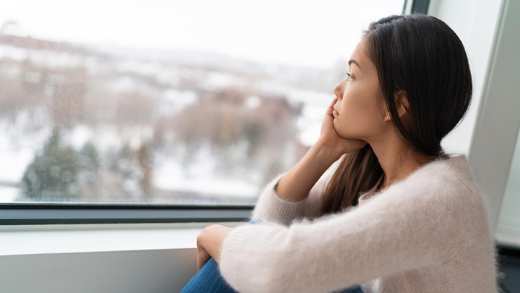Seasonal affective disorder
The causes, symptoms and remedies to SAD

What causes SAD?
While we don’t know exactly what causes SAD, it’s widely accepted that it’s linked to how much sunlight your body is exposed to, or in most cases, how little.
The main theory Footnote [1] is that less exposure to sunlight can affect a part of the brain called the hypothalamus which increases the hormone melatonin, causing you to feel more tired, and reduces serotonin levels, causing feelings of depression, affecting your mood and appetite.
It’s also thought that shorter days can disturb your body’s internal clock, disrupting important functions, like knowing when to wake up and go to sleep.
Summertime sadness
Most cases of SAD happen in the winter, but it’s possible to have symptoms in the summer months. This is because too much sunlight can interrupt your sleep-wake cycle which can make getting to sleep harder.
Without the sleep you need, your serotonin levels can drop and similarly to winter SAD, you may feel depressed.
What are the symptoms of SAD?
The symptoms of SAD can include:
- Feelings of despair, guilt or worthlessness
- Stress and anxiety
- Indecisiveness
- Low self-esteem
You might lose interest in the world around you, and experience these other effects:
- Feelings of lethargy
- Oversleeping
- Difficulty concentrating
- Increased appetite
You might get symptoms from September to November, though they could last until the following May. Or if you get SAD in the lighter months, your symptoms might be worse between March and the start of autumn.
A less-severe version of SAD, known as the ’winter blues’, mainly happens in December, January and February. This is more common, and symptoms tend to be mild.
You should see your GP if you’re suffering from any of these symptoms.
How SAD's diagnosed
As SAD symptoms are so similar to other types of depression, it’s sometimes hard to diagnose.
Your GP may ask you about seasonal changes to:
- your mood
- your lifestyle
- your eating and sleeping patterns
- your thoughts and behaviour
- your ability to do your usual activities
They’ll also ask about your family history, as genetics may play a part.
As it’s a seasonal disorder, you may need to have these symptoms for a few consecutive winters or summers to be diagnosed.
Managing your SAD symptoms
Mental health charity Mind says Footnote [2]if you’re prone to experiencing SAD, there are things you can do that might limit its effect:
- Get outside – make the most of natural sunlight by spending as much time as you can during the day outdoors
- Stay healthy – manage your diet and exercise regularly
- Try to avoid alcohol and drugs - while you might want to use drugs or alcohol to cope with any difficult feelings, in the long run they can make you feel worse
- Plan ahead – use the summer to plan enjoyable things to do during winter
- Talk to someone – don't bottle your feelings up
If you’ve been diagnosed with SAD, your GP may recommend the following treatments:
Cognitive behavioural therapy (CBT)
This is a type of talking therapy commonly used to treat anxiety and depression. CBT helps to challenge and change negative patterns of behaviour.
Antidepressants
These can treat severe cases of SAD, but evidence suggests its effectiveness is limited as most medication causes drowsiness.
Your GP can help decide whether the need is greater than any potential side effects.
Light therapy
Light therapy can work by stimulating you with the light you don’t usually get in winter. This encourages your brain to produce less melatonin and more serotonin, so you feel more alert and your mood is boosted.
You should use a light box every day from early autumn for around 30 minutes to one hour. You can use it while doing your normal activities like watching TV or reading.
That said, you should talk to a health professional if you’re considering using light therapy, as it’s not suitable for everyone.



